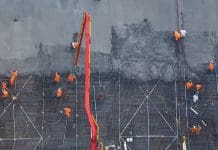Sam Ibbott, Deputy Public Affairs Director at Environmental Industries Commission examines the latest government consultation on SuDs and the new approach of delivering it through the planning system
The photo-op, when staged, can be a politicians dream. If you follow politics, particularly at a local level, they can often be unintentionally hilarious – such as the classic pose of an MP crouched down and pointing at a pothole with a look of horror on his or her face as if the pothole had just said something rather untoward about their mother.
So when the country saw widespread flooding last year it was unsurprising that MPs of all colours hastily donned waders and took the opportunity to get photos of themselves looking sympathetic next to people whose lives had at best been inconvenienced and, at worst, devastated by rising water levels.
National infrastructure concern
Flooding is a national infrastructure concern, and with the issue so high in the public’s consciousness it would have been an opportune moment to announce at least one practical step forward – the implementation of Sustainable Drainage Systems (SuDS). SuDS are the process of dealing with excess surface water by mimicking natural processes which slow the movement of water before it enters rivers or streams, or stores the water so it can either soak into the ground or evaporate. Not in themselves the answer to all flooding concerns by any means, but SuDS have an important role to play – particularly in an urban environment.
The independent Pitt Review on flooding, which first recommended the greater uptake of SuDS, was published in 2008 and they were formally legislated for two years later in the Flood & Water Management Act (2010). An initial consultation on their implementation (as required by Schedule 3 of the legislation) closed in early 2012, and two ‘go live’ dates were subsequently announced and later rescinded.
Then in September of last year the government went to consultation again with a new approach for implementation which intends to deliver SuDS through the planning system. The government published its formal response to this consultation in late December.
The consultation saw a diverse range of submissions from local authorities, water companies, property developers, consultants, community groups and trade associations (including the Environmental Industries Commission (EIC)). At EIC we raised a number of concerns, many of which were at least acknowledged in the government’s response and/or subsequently dealt with to varying degrees.
Chief among the issues we raised were that:
- The latest consultation document framed SuDS almost exclusively in terms of flooding, and did not take into account their potential impact on water quality;
- Whilst the consultation’s focus on the ongoing maintenance of SuDS is welcome, hastily delivered but inappropriate or poorly installed SuDS have the potential for much higher maintenance costs in the long run;
- Local planning conditions have not always been effective in the past – with houses being built on flood plains for example;
- There is a potential loophole in the proposed exemption from SuDS requirements for ‘micro’ developments (fewer than nine properties) in that a major development could be reclassified as numerous smaller ones. There will also be an onus on the local planning authority to monitor the cumulative impact of numerous micro developments in their area.
In a Written Ministerial Statement published alongside the consultation response, the government made clear their “expectation” that sustainable drainage should now be included as part of major new developments “unless demonstrated to be inappropriate” – which could, for example, be the result of ongoing SuDS maintenance not being “economically proportionate”; if SuDS were to impair the deliverability of the development; or if they were to place “an excessive burden on business.”
SuDS requirement
Despite this, EIC welcomed the government’s emphasis on a requirement for SuDS to be maintained over the lifetime of a development. Although the market in third party SuDS maintenance is relatively immature and there are potential difficulties in gauging the robustness of maintenance providers and their expertise, we feel it is an important principle to have set out from the start.
There is in any case a suite of maintenance options for developers to choose from, allowing a level of flexibility in the methods by which this maintenance will be funded and delivered. Responsibility for putting an arrangement in place, whatever its make-up, however, remains the responsibility of the developer as part of the planning application process.
Responses to the consultation did however raise concerns over a lack of technical expertise at local government level, particularly in smaller local authorities, to determine the suitability of sustainable drainage proposals when assessing planning applications – which can lead to inconsistencies. Although not originally proposed in the consultation document as a channel for securing the required expert advice, the government has subsequently accepted that the Lead Local Flood Authority (LLFA) are well placed to provide advice on such issues due to recent provisions in the Flood and Water Management Act which gives these bodies overall strategic responsibility for local flood risk management, including surface water. The government now intends to consult on making LLFAs a statutory consultee for planning applications on surface water management.
These changes to planning will take effect from the 6th April 2015 and the government intends to publish revised planning guidance in advance of this date, in addition to engaging with local government on a capacity building programme.
By this time it will have been seven years from recommendation to implementation – far longer than had been hoped. The new approach of delivering SuDS through the planning system will likely see them delivered more quickly, if not automatically to a high standard given the disparity of resources and expertise within and across local authorities. It is the path of least resistance, but whilst not ideal it is workable and certainly preferable to even further delays by going back to the drawing board.
With an ever-increasing call for more housing to be built, and all political parties likely to make a related commitment in their general election manifestos this year, it is important to get SuDS regulations in place as soon as possible as our towns, cities, and urban spaces become ever more densely populated. If the result of a wider spread use of SuDS is fewer photo opportunities for MPs, that’s a price worth paying.
EIC is the trade association for the UK’s environmental technologies and services sector.
Sam Ibbott
Deputy Public Affairs Director
Environmental Industries Commission (EIC)
Tel: 020 7222 4148














